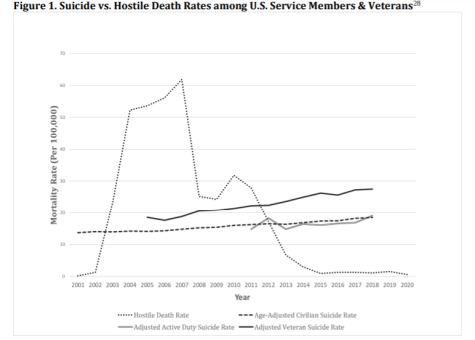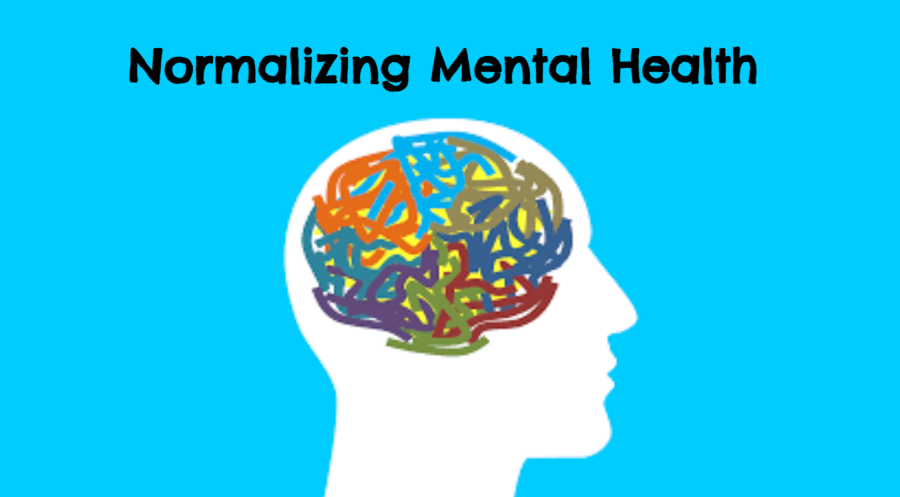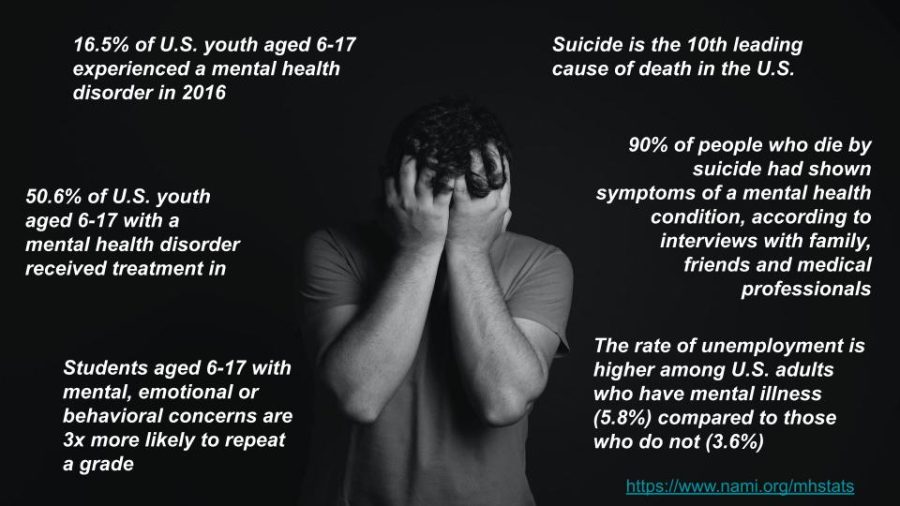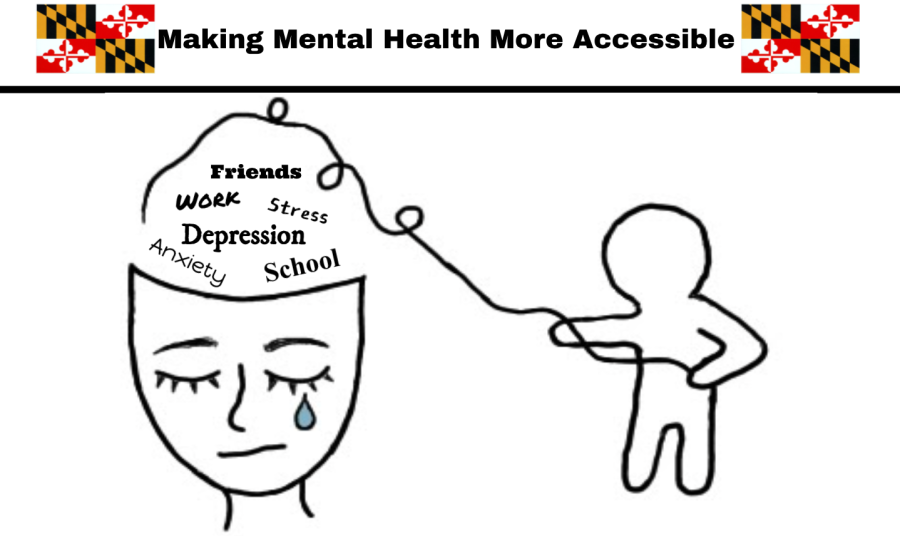What schools can do for the “new” mental health crisis
“Suck it up buttercup” is an older term that most commonly refers to people that may be struggling with mental health. Is this “get over it” mentality helpful for people with mental health problems?
What exactly is mental health? According to mentalhealth.gov, “mental health includes our emotional, psychological, and social well-being.”
In most recent years there has been a significant incline in regards to mental health problems (even before the pandemic) across the nation plaguing all generations. Nine to forty year olds are affected the most according to the MHA. A study done by Polaris Teen Center showed “approximately one in five teens (aged 12 to 18) suffer from at least one mental health disorder.”
Students that show signs of depression are twice as likely to drop out of school. Students may be feeling alone when it comes down to problems they may be facing, even when other kids could be feeling the same way.

Some people might not see the importance of taking care of mental health but mental health affects people of all ages and professions.
According to a report, “Cost of Wars” by Brown University, it “estimates 30,177 active duty personnel and veterans of the post 9/11 wars have died by suicide, significantly more than the 7,057 service members killed in post-9/11 war operations.” This statistics is staggering considering America is the land of wealth, but we fail to provide good enough support to those who fight and protect this country.
Well how do you help a problem that is so ingrained in society? The answer seems is schools. Schools have the capacity to teach their students the in and outs of the real world and problems that come with it. If schools seem to be one of the many ways to help societal mental health problems, what can be done by them, and why is it not happening?
Normalcy- Make it normal to talk about
When a child walks into a classroom with a cast on its foot, do you shun them or keep quite like their foot is a “secret?” The answer is no, so why does it seem that people with mental illness or mental health problems tend to be quiet and not talk about it?
As society changes, we believe that maybe the stigma against mental health is disappearing, but that simply is not the case. People still have trouble coming to terms with it, scared of what others will think and say. This “what will the neighbors think” mentality is extremely damaging for society.
Schools should be teaching more about mental health earlier. Children learn differently, but the way mental health is taught can be vital to challenging and defeating this stigma. Kids should be able to learn what mental health is and see that everybody can face it at some point in time, and that it is normal. Normalcy, an important role in combating mental health stigma. Stigma that can drive some people into places they can not get out of because of fear of what others may think, and the self hatred they may feel because they feel different from others.
Children do not see this stigma when they first experience somebody with mental health, but it is taught to them, by them seeing first hand on how people with mental health problems are treated. They see people treat them as though they are different when really they are no different from others, but treating them the same and teaching kids why it is okay to feel different from others. If we teach in schools from an early age about physical health (and nutrition) why is mental health not a category touched, because to us it contributes to our day to day live just as much as our physical well being.
Inform the Parents
Parents may be quick to judge on behalf of their kids whether what they are feeling is valid or not. This leaves the kids in a bind, not knowing if they should believe their feelings or their parents. While not all parents are like this, a significant number of parents are not able to relate (to new reasons why their child struggles with mental health), meaning it is hard for them to understand how their child feels.
Schools could host informational meetings for parents with children that have children as young as elementary school students. Why wait for a problem to happen in maybe the adolescence stage, and be ignorant about mental health issues.
Counselors could help teach parents signs, and ways to help their child if they do experience problems. They could also help parents find referrals through a mental health professional, to get their child outside help. A survey done by very well mind, a website centered around mental health, found “one in five parents are extremely concerned about their kids’ mental health right now, and 60% of parents are at least moderately concerned.” If parents are becoming more concerned with their children’s mental health, the information given to them about it should too.
Teaching about the harms of social media
With social media increasing every day, algorithms are created to catch the viewer’s eyes. The content that is the most eye catching can also be the most harmful to young and impressionable minds. Facebook was recently exposed for sending targeted information that has been known to be harmful to teens. With this new leak came information that many people already knew, but why aren’t we spreading this information in the curriculum. Fredrick county’s curriculum have a unit on the dangers of social media, but only focus on the fact that something you post will stay online forever. We need to go past this and teach about how misinformation is spread, and how unrealistic life/beauty standards are spread.
I have experienced [Social Media] as a user and as a parent of two children. It has more negatives than positives. It gives kids a false sense of reality and the instant gratification is gives kids is a big problem because it makes it so kids are only satisfied by fast- pace information
— Patricia Kolias
While some put child blocks on social media, many teens know how to get around them. So is trying to put a band-aid on phones going to help because what happens when this band-aid falls off? Many children are sent in blind to social media, leaving all this information at their finger tips, causing more harm than good.
Funding
Funding can be used to provide extra counselors, school therapists, and behavior specialist. These are fundamental for a “happy” school.
Student protest have are not new, and neither is mental health. Protest are a way to apply pressure to the state for change. This change in how money is allocated to schools is very important. The more pressure applied, and the more laws put in place in line with mental health, the better.
Maryland law expands mental health help for children
Regardless of the ever growing acceptance for mental health, it is still a widely unexplored topic in many households. Despite this stigma, it is completely okay not to be okay.
Recently, a new law in Maryland allows children as young as 12 to receive therapy without parental consent, the previous age for this being 16. The law was set in place on October 1st. Despite seeming helpful, the law has many who are opposed to it.
The law states, “Altering the minimum age, from 16 years to 12 years, at which a minor has the same capacity as an adult to consent to consultation, diagnosis, and certain treatment of a mental or emotional disorder by a health care provider or clinic; and providing that a health care provider may decide to provide certain information to a certain parent, guardian, or custodian under certain provisions of law unless the health care provider believes that the disclosure will lead to harm to the minor or deter the minor from seeking care.”
Introduced in 2020 and passed through Maryland’s senate, the bill did not make it through the House due to the pandemic. As the bill was reintroduced, it passed in both chambers. Maryland’s Governor, Larry Hogan approved the bill without hesitation.
Though approved, many Republicans in the Maryland legislature believe that the bill will hinder a child’s mental health rather than help. They argue that with the exclusion of parents, therapy will practically be rendered useless.
Susan W. Krebs, a republican from Carroll County says, “I just don’t see the situation for this. It’s really problematic.”
I strongly disagree. What Krebs fails to consider are the numerous children in abusive homes.
Licensed therapist Jennifer Howell says, “I believe that there is an argument for both [sides]. Therapy does work best if parents are involved but also taking into account that parents want to be involved. Parents can request all of the minors’ records and when the client has a problem with their parents, this can be tricky. It would give teenagers more control over their care.”
Of course, some children may suffer with the exclusion of their parents in therapy, but it is important to consider children in abusive households as well. There are many children who do not feel safe communicating with their parents and ultimately feel more hurt than helped when they do seek help from them.
Overall, Howell believes that this law is helpful for patients, referencing the fact trust is an essential aspect in therapy. She says, “I do think that this is a helpful law. It gives me more control over what I share with my client’s parents. Trust and rapport is so vital to therapy. My client’s need to feel like their privacy will be respected. For example if my client comes out to be and if not ready to disclose that information to their parents.”
On the whole, the legislation provided real benefits for children in abusive family situations, and that outweighed the issues raised by advocates for a veto
— Michael Ricci, spokesman for Governor Hogan
A survey done in 2019 by Youth Risk Behaviors says that 8.9% of teens, grades 9-12, have had at least once suicide attempt. The mental health crisis amongst teens continues to increase, with some even considering the it an epidemic. The pandemic has only worsened it as substance use and suicidal thoughts are said to have increased, affecting all ages. There is no doubt that the rising mental health struggle has had a harmful effect on teens.
Guidance counselor Katherine Becker said, “Most school counselors are not licensed therapists so our focus is to get students who are struggling with emotional issues to a licensed professional who can focus just on their mental health. Any mental health counseling that I do is considered “band aid” therapy, meaning to listen and counsel a student with the intention of getting them back to class and through the rest of their day and connecting them to outside supports as needed.”
Therapy is much different than talking to a guidance counselor. A therapist works with the client to find the best coping mechanisms specifically tailored to them. The ultimate goal is to supply the client with enough coping mechanisms that ultimately allow them to sail through life with ease.
A child who is struggling at home and comes to their counselor for help may receive temporary aid, but the ultimate goal is not to “heal” the student, as Becker says. A guidance counselor can only do so much before the student must go back to class. Children in abusive homes will not receive the correct help they need.
My parents who grew up in difficult households did not receive help until they were adolescents, at which point, they entered themselves into therapy.
My mom, Tanya Higbee-Cerny, says, “My parents decided to take me to therapy very reluctantly when I was about 16 years old. They attended one session with me and decided it was not necessary. I think therapy would have helped me recognize that I am not alone, nor weird. I think it would have helped me with self-esteem which would have helped me navigate my teen years with less loneliness and angst.”
Whether it be parents refusing to acknowledge the fact their child is struggling, the disbelief that mental health is not a true concern, or something more, mental health is a taboo subject in many households. Children should not have to suffer because their parents are unaccepting.
Like my parents when they were young, there are many children out there who need help who are not receiving any. I have many friends who I know suffered during the pandemic and there is only so much I can do for them when we are both quarantined.
Junior Chloe Kim was one of the many people who struggled during the pandemic. “Last year, my mental health had worsened quite a bit and my mom had noticed. She decided she would try and get a therapist in hope that this would help me, however as time went on it kept being put off but eventually time came and she had potentially found someone that could help. Yet again nothing seemed to be put into place, overtime I decided that there was a very high chance that I was not going to be getting a therapist and I ended up battling these struggles on my own.”
Despite how much we’d like it not to be this way, abusive households will always exist. This new law in Maryland, though has its opposition, will ultimately do more good than harm. Children with a complicated family life need a safe space in order to heal and develop coping mechanisms and this law helps them with exactly that.
Hotlines
National Suicide Prevention Hotline: 1-800-273-TALK (1-800-273-8255)
SAMHSA Treatment Referral Helpline: 1-877-SAMHSA7 (1-877-726-4727)
Maryland Crisis Hotline Network: 1-800-422-0009



